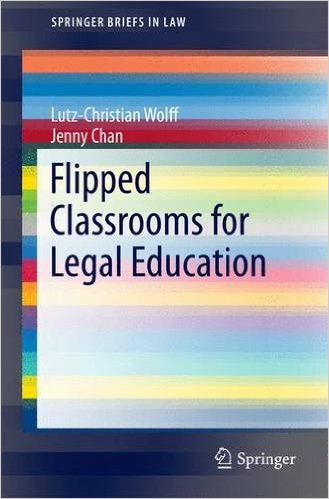 New Book “Flipped Classrooms for Legal Education” by Professor Lutz-Christian Wolff & Jenny Chan Is Released
New Book “Flipped Classrooms for Legal Education” by Professor Lutz-Christian Wolff & Jenny Chan Is Released
Technology has accelerated the speed and innovated the modes of information dissemination. It has also varied the delivery modes of education by means of different online tools.
Professor Lutz-Christian Wolff, being supported by the CUHK Teaching Development Grant, conducted a year-long project to study the viability of the Flipped Classroom concept in legal education. The findings are published in his new book (co-authored with Jenny Chan) “Flipped Classrooms for Legal Education”.
The Flipped Classroom model has become increasingly popular across various disciplines, but only to a lesser extent in legal education. A flipped classroom generally provides pre-recorded lectures (video or audio) followed by in-class activities. Students view the videos before coming to class, where the freed time can be devoted to interactive modules such as Q&A sessions, discussions, case simulation, role-play or other learning activities.
The book discusses comprehensively the use of Flipped Classrooms in the context of legal education. It analyses the pedagogical viability, costs and other resource-related implications, technical aspects as well as the production and online distribution of Flipped Classrooms. It also compares the advantages and disadvantages of the Flipped Classroom concept with traditional legal teaching methods. The findings are tested by a case study which serves as the basis for the development of comprehensive guidelines for the concept’s practical implementation.
Details of the book can be found at here.
Professor Steven Gallagher Issues a Paper on “Is Hong Kong Still the Best Place to Buy Illicitly Obtained Art and Antiquities from Southeast Asia?”
The states of Southeast Asia have developed domestic and international legal and regulatory measures to counter the trade in illicitly obtained and illicitly exported art and antiquities. However, the battle against this trade is not helped by the presence of a nearby market state which rather than prohibit it has legal provisions in place which may actually encourage it. Hong Kong has recently been acknowledged as one of the worlds’ major markets for art and antiquities. Hong Kong’s geographical position, jurisdiction, and established art and antiquities trade have made it a target for the international art and antiquities trade attempting to secure part of the seemingly insatiable immensely lucrative mainland market. Long regarded as a major illicit market for art and antiquities from Southeast Asia, the boom in the legal trade brings an associated boom to the illicit trade to meet demands the legal trade cannot meet. The illicit trade is further supported by deficiencies in Hong Kong’s legal and regulatory framework intended to prevent it.
The paper, which was released at the Southeast Asian Archaeology Conference in Bangkok on 1st June, first considered the legal and regulatory framework in Southeast Asia intended to prevent the illicit trade in art and antiquities. The paper continued with an examination of the legal and regulatory framework in Hong Kong. The paper then considered the remnants of English common law that may now encourage the illicit trade in Southeast Asia. The conclusions suggested how quite simple reform could help Hong Kong become a force to counteract the illicit trade in art and antiquities in Southeast Asia.
Professor Michael Ramsden and Professor Stuart Hargreaves Release New Book on the Basic Law
The Basic Law Handbook is the authoritative restatement of constitutional law in Hong Kong, offering article-by-article commentary on the key judicial and constitutional developments in Hong Kong. It contains detailed analysis of key legal principles derived from the Basic Law, with citations and discussion of important cases. The Handbook traverses each Article of the Basic Law with annotations and commentary, distilling the essence of judicial and legal authority in an accessible format. It enables reader to form advanced, nuanced understanding of the Basic Law’s provisions whilst offering a focal point for undertaking Basic Law-related research.
Details of the book can be found here.
Professor Steven Gallagher Prepare a Paper on “The Business of Death in Hong Kong: Regulating Unauthorised Land Use while Recognising Chinese Custom and Chinese Customary Law in Hong Kong’s Law of the Dead”
As with most jurisdictions, death is big business in Hong Kong. The cost of death in Hong Kong is further complicated by Hong Kong’s unique status in the world in retaining in uninterrupted practice so many elements of Chinese custom including death and funerary rites. Thus when a traditional funeral in accordance with Chinese custom is undertaken, which involves a traditionally constructed coffin, paper offerings, religious ceremonies, death banquets and feng shui consultations for placement of the grave, the cost may be so exorbitant that the deceased may save all their lives to pay for their deaths, or their families may be forced to go into debt to provide a suitable funeral out of filial piety, to ensure the family’s feng shui fortune and to prevent the deceased becoming a ghost. Of course, a resting place for the deceased’s remains is still the most expensive element of the cost of the funeral arrangements, especially in a jurisdiction that has very little usable land.
This paper, which is prepared for the Death and Culture Conference at the University of York in England on the 1st September, considers the problems of the law of the dead in Hong Kong. The paper first examines traditional Chinese funerary practices incorporated into the law of Hong Kong including “trusts for the dead.” The paper will then examine the British colonial administrations attempts to change Chinese funerary practices in Hong Kong. The paper will conclude with discussion of recent cases involving the post-colonial Chinese government’s attempts to restrict the use of unauthorized resting places for deceased remains by interpreting and applying British colonial law and regulation.